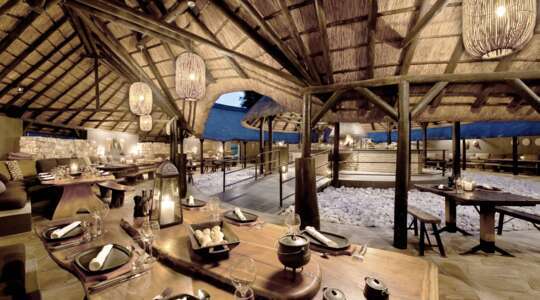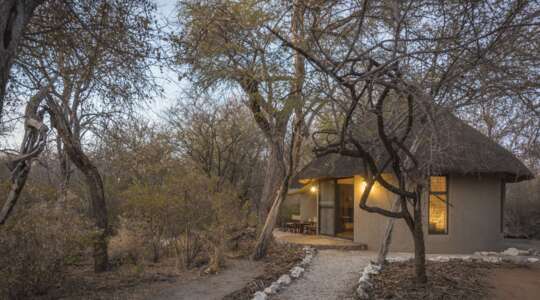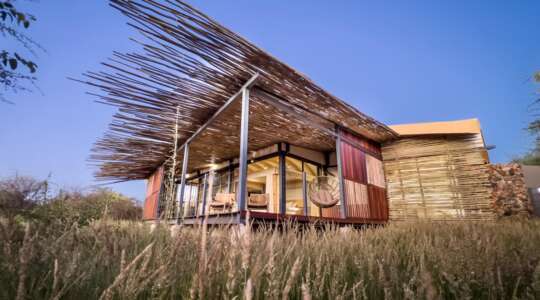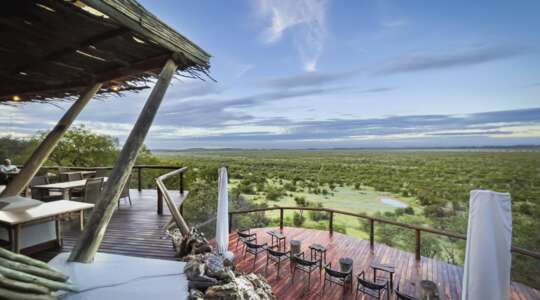Speak to one of our experts now about this offer
Call our Africa experts on0800 294 9706
Available until 2pm
Onguma Tented Camp offers a true African glamping experience.
Onguma Tented Camp is unfenced so there is a good chance of seeing wildlife, including elephant, kudu and giraffe from your tent. During the morning and afternoon game drives, you may be fortunate to see big cats and one of the endangered black rhinos that live in the reserve and are heavily protected by the reserve’s anti-poaching team.
Guided walking safaris are a great way to learn about the reserve’s environment and photographers love the opportunity to view wildlife at the Onkolo hide. The rim-flow pool is a great place for relaxing between game activities.
Why we love Onguma Tented Camp
-
You can lie in bed with the canvas door open, watching wildlife mingle around the waterhole
-
One of the best places to photograph wildlife is at the Onkolo hide, where you can observe animals at eye level
-
You can enjoy incredible sunsets from your deck and the sky is filled with twinkling stars on a clear evening
-
Aptly named, Onguma means 'the place you don't want to leave' in the Herero language
Unique experiences
Walking safari at Onguma Nature Reserve
Immerse yourself in the Namibian wilderness with a guided walking safari on the Onguma Reserve. One of the experienced rangers will take you out early in the morning, when it’s cooler, for a leisurely stroll through the reserve. The idea is to learn about the smaller details of the bush that you skip past on a game drive. Your guide will point out everything from animal tracks to termite mounds and medicinal plants used by local communities.
Spend a night on the Dream Cruiser
Spend a night alone in the Namibian bush with the unique Dream Cruiser, a modified safari vehicle that has a full bathroom and sleeping deck. The cruiser is parked alongside an active waterhole in a secluded area of the Onguma Reserve, so you can watch the wildlife come and go and then fall asleep to the sounds of animal calls. It’s a very Instagrammable location. The deck cover is removable so you can stargaze in bed, soaking up views of sparkling constellations and on a clear night, the Milky Way.
Onguma Game Drive
Encounter Onguma’s diverse wildlife on game drives with experienced rangers. The reserve covers 34,000 hectares of Namibian landscape home to over 30 mammals and 300 bird species that roam freely. There's a healthy population of endangered black rhinos protected by a dedicated anti-poaching team. The team is funded by tourism, so when you stay here, your money goes back into protecting these precious animals.
Facilities
Evening drinks are served around the firepit and African-fusion menus include game meats and produce grown on the 500-acre vegetable farm staffed by villagers from the local Oshivelo community.
Alongside facials, manicures and pedicures, African inspired massages using heated bamboo and calabash are just some of the treatments available here.
Take morning and afternoon game drives into Etosha National Park in search of the over 100 mammals that live there. Get closer to nature on an interpretative bush walk or take a sunset drive on the Onguma Reserve.
Children over the age of 12 are welcome.
All Hotels in Etosha

- Etosha
Mokuti Etosha Lodge is a contemporary interpretation of Namibia’s landscape.

- Etosha
In the local Herero language, Onguma means ‘the place you don’t want to leave’ which perfectly describes Forest Camp.

- Etosha
Situated on one of Namibia’s largest private reserves, Ongava Anderssons Camp is a luxurious camp with a strong focus on eco-tourism.

- Etosha
Ongava Game Reserve is a 30,000-hectare nature reserve made up of former cattle ranches located next to Etosha National Park.
Sorry, your hotel is no longer available
Please check alternatives
-
{{item.body}}
-
{{item.body}}
Choose a departure date
{{store.searchDuration}} nights
Enter rooms & guests
Checking prices & availability

{{term}}, {{formattedDate}} for {{searchDuration}} nights

_w=24_h=25.png?v=910f6de5506872363a0d58b9f40775d869aae637)
_w=24_h=25.png?v=910f6de5506872363a0d58b9f40775d869aae637)
_w=24_h=25.png?v=910f6de5506872363a0d58b9f40775d869aae637)